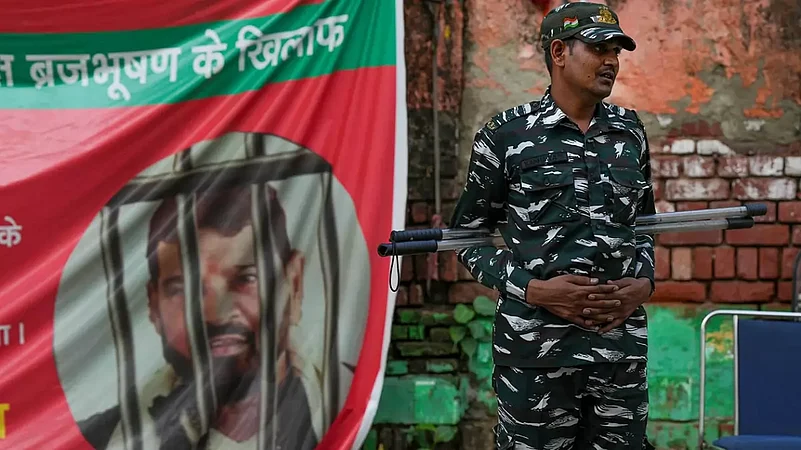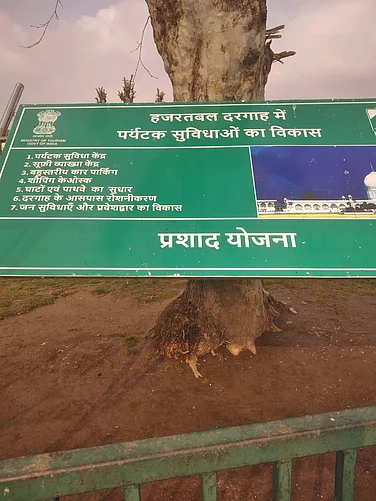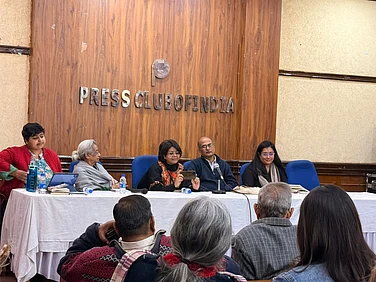The courage, determination, commitment and steadfastness with which the country’s top wrestlers (including Olympians) have been protesting against Brij Bhushan Sharan Singh, long-time president of the Wrestling Federation of India (WFI), is truly extraordinary. Their public struggle for justice began in mid-January 2023 and was resumed in late April in the absence of any real action against Singh, a six-time Member of Parliament from the ruling Bharatiya Janata Party (BJP), accused by them of sexual harassment and intimidation.
The two First Information Reports (FIRs) finally filed by the Delhi Police on April 28, based on the complaints of half a dozen wrestlers, including a minor, reportedly list many incidents of sexual harassment and molestation (including inappropriate touching), several instances of intimidation (including stalking) and some occasions when the WFI chief asked for sexual favours in exchange for professional assistance.
Over the past five months, the protesting athletes, once feted for glory and medals won at prestigious international sports competitions, have endured both physical and psychological distress—disappointment at the continuing indifference and inaction of the government and the sporting establishment, including PT Usha, the first female president of the Indian Olympic Association (IOA) and a nominated member of the Rajya Sabha; violent attacks by the Delhi Police on two occasions last month, most publicly and horrifyingly on the day the new Parliament was inaugurated with controversial pomp and ceremony; sluggish and sparse support from fellow sportspersons, especially high profile cricketers, although the brutality of the May 28 crackdown appears to have persuaded more of them to break their silence; repeated attempts to discredit their struggle for justice as a front for partisan politics based on region and caste; streams of abuse and misinformation on social media and, most recently, canards reported as news about protest leaders giving up the fight— just because they rejoined duty as railway employees—and about the traumatised minor withdrawing her complaint.
It is incredible and admirable that, despite all these discouraging setbacks, despite having had to brave the elements camping out at their open-air protest site in the capital for several weeks, the protestors’ spirit and resolve appear to have somehow survived so far.
Early and sustained support from farmers’ organisations and khap panchayats from their home state of Haryana must have been a source of strength. Expressions of support from other quarters, including international sports organisations and major trade unions, and from ordinary citizens across the country may have bolstered their confidence. In Karnataka, for example, not only have a series of demonstrations taken place in Bengaluru, but events have been reported from Belagavi, Kolar, Mandya, Mysuru and Vijayapura.
However, as several experienced lawyers and at least one former police commissioner have pointed out, the road ahead will be far from easy. The fact that Singh continues to strut around unimpeded, brazening it out, rallying “seers” to his cause and making outrageous statements about forcing the government to change the law meant to protect children from sexual offences (POCSO) tells its own story. His apparent impunity cannot but be putting tremendous pressure on the complainants; the longer he remains free the more difficult the situation will become.
But even if and when it emerges that Singh is not totally above the law—despite his obvious political clout, strongman reputation and friends in high places—given the glacial pace of the legal and judicial process in India, the wrestlers’ fight for justice will clearly not end with his arrest. The wait for a final judgment could stretch over many challenging years.
In an article written in January 2018, soon after the sentencing of Larry Nassar, the former official doctor of USA Gymnastics, in a case involving what has been described as the “worst epidemic of sexual abuse in the history of sport”, sports journalist Sharda Ugra listed several cases of sexual harassment and abuse that had come to light between 2009 and 2017 in various fields of sport in India. Writing in the midst of the #MeToo phenomenon that swept across the world in 2017-18, Ugra was evidently convinced that only the voice of an influential female athlete could unlock the floodgates that would finally expose the predators lurking in the Indian sports world. “Stand up against and call out your Nassars,” she wrote. “And one day, one of them will be sent to prison.”
Sakshi Malik, Vinesh Phogat, Bajrang Punia and their colleagues have called out their Nassar. Their pursuit of justice has so far been heroic. But this fight cannot remain a Grapplers vs. Groper bout if their powerful tormentor is to get his just deserts. And it is important that he does—for the sake of not only the complainants but also the many girls dreaming of excelling in sports for whom they are role models. Harking back to the 2015 Je Suis slogan, maybe we are all wrestlers now—or should be.
(Views expressed are personal)
Ammu Joseph is a senior independent journalist and author based in Bangalore





















